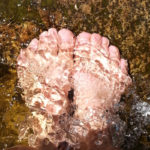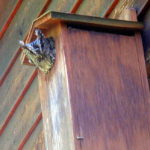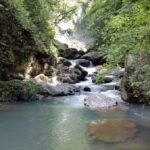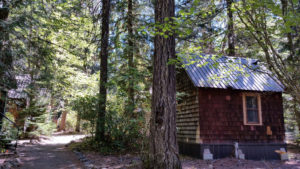The Healing Power of Nature – aka “Forest Bathing”
As a holistic nutritionist and building biologist, I am always on the lookout for anything that can affect our health, either positively or negatively. The more I do this work, the more I realize that no matter our diet, toxic load, or the health of our environment, nothing has a bigger impact on our physiology than stress.
This is surely not news to you. You know that stress has huge implications on your health. You know you need to manage it. But in today’s world, there is so much coming at you that you never quite find the time. Or perhaps you have so much anxiety around the act of sitting still, meditating, or other perceived stress management techniques that you just continue to avoid the topic altogether.
The fact is, if you want to live your best life possible, then you absolutely must do what you can to mitigate the effects of stress in your life. Thankfully, this does not mean you have to sit in silence for hours each day. You don’t need to see your therapist, nor talk about all the childhood trauma in your life. Don’t get me wrong these things can be quite helpful, but not everyone is willing to go there. That’s why I’m so excited about this guest post from my friend Sari Telpner. Sari is a Certified Forest Therapy guide who lives in Ashland, Oregon. Forest therapy is such a simple, yet profound technique to not only mitigate your stress, but open you up to a whole new way of being.
I have been a participant on several of Sari’s guided walks through nature. They were so healing for me, and so simple to do, that I wanted to introduce this topic to as many people as possible. So without further ado, let’s dive in to Sari’s wisdom:
How often do you take the time to immerse in the natural environment around you? Only a very small percentage of people work in environments such as forests, parks, nature preserves and small family farms or ranches. Statistics show that 85% of The U.S. population lives in urban areas.
I am grateful for the life I live, surrounded by nature. At age 4, my family moved to a home in a heavily forested area in S.W. Iowa. As a kid, my days outside of school were spent with my friends or in solitude in the woods. My sister and I walked a trail through the woods to school each day. Through most of my adulthood in Oregon, I have lived near neighborhood parks and hiking trails. Five years ago I moved to my home, set beside a pond, creek and meadow, where I gratefully spend time daily, practicing Qigong, reading by the water or simply sitting on my favorite rock, watching the creek rush by. My favorite oak tree is in the meadow next to the creek and I practice tree hugging. A pair of owls nest in a box just under my bedroom window, next to a massive old oak and raise a new clutch of babies each spring. Throughout the week, I walk a half a mile up the hill to the forest and trail head, where I hike; explore trails; the creek and visit a waterfall.
“Through nature we recharge our energy, release stress and gain an understanding that there is so much more to life than our myopic, limited view of our personal story. We tend to focus on our pain and suffering and the things that hurt. The work of true healing is allowing for the totality of experience. When we go through what feels like excruciating suffering, and become stuck in the sense of “only me”, it is essential to feel and understand there is a much greater world available to experience.”
While we may understand that taking a hike or a walk through the forest is a good thing, few have time to stop during their busy lives and step away from the frenzy of the world of work. This can vary depending on where you live. Some people choose to live within easy access to nature. Most of us appreciate the peace and beauty found in nature. Many live for the weekends to get out of town to a lake, the beach or the mountains. Some appreciate the gift of living in close proximity to nature which becomes part of daily life and unfortunately, many people living in marginalized communities, may have very little access to nature.
Evidence-based health research demonstrates that spending time in a forest has positive benefits for both physical and mental health. It’s not like any of us don’t know that being in nature feels good and invigorating, but, it is very exciting to see data showing that even as much as 5 minutes in nature, green spaces and around trees may improve one’s health.
Health benefits of spending time in nature, specifically, forests, include:
- Accelerated Healing following Illness and Surgery
- Decreases Blood Glucose Levels in Diabetic Patients
- Improved Energy
- Improved Focus in children with ADHD
- Improved Mood
- Improved Sleep
- Increased Immune Function
- Increased Mental focus
- Lower Blood Pressure
- Reduced Stress



In 1982, The Japanese Ministry of Agriculture and Forest and Fisheries named a practice of spending time in the forest for health and healing, “Shinrin-yoku”, which means, taking in the atmosphere of the forest. It translates as, “Forest Bathing.” These ministries in Japan encourage their citizens to spend time in forests to improve health through this stress-relieving practice of simply being among the trees.
Being in the forest increases immune function. Trees release chemicals into the air called, phytoncides which serve to protect them from insects and other invaders. These chemicals help the trees stay healthy through their antibacterial and antifungal properties. When we take a walk in the forest, we breathe in these phytoncides which are suspended in the forest air. Breathing in these chemicals, cause our bodies to increase the activity and the amount of a certain type of white blood cell, called natural killer cells (NK). These are tumor-killing and virus killing cells which protect our bodies from foreign invaders. The remarkable news is that the research shows that the increased NK activity from 3-days and 2-nights in the forest lasted in the body for over 30 days. Specific research in Japan is now looking at if these forest chemicals may prevent specific types of cancers.
Based on research, spending time with the trees and looking at the trees reduces stress, improves mood and lowers blood pressure. Wowza! Stress is one of the major triggers of much of the illness we see today and stress hinders immune function. Studies to date are showing that simply sitting and looking at trees or exercising in the forest, reduces blood pressure along with the stress-related hormones, adrenaline and cortisol, calming the “fight or flight” response. It is interesting to note that when the researchers looked at unplanted urban areas for comparison, they found no reduction in stress-related effects. Other research shows that immersion in the forest significantly decreases, anger, anxiety, confusion, depression and fatigue. These stress reduction benefits would increase immune function, offering amplified support for staying healthy.
Many cities all over the world offer beautiful, dense, green parks. I remember when my family moved to Portland close to 30 years ago, I was in a state of bliss when I discovered the massive park and conifer trees across the street from our home. Urban green areas are essential since many have no way of getting to a rural forest. Luckily, through thoughtful city planning, many cities have parks and green spaces, botanical and community gardens and trees along streets where we can breathe in the health-supporting chemicals of plants and trees.
Additional studies on “Forest Bathing” show that recovery time after surgery is shorter when patients are given a green view. Being hospitalized is incredibly stressful. Patients suffer with their physical or mental problems, as well as being stuck under artificial lighting, noise 24/7, lack of privacy and most often, processed foods. The stress alone from the hospital environment could make anyone sick. All of these factors can set one way back in their ability to heal. The research found that patients who had a green view went home sooner, took less pain medication and somewhat less post-surgical complications as compared to those who had no view of nature. In some cases, some hospitals offer more than just a view of nature. Not many are aware of it, but some hospital rehab centers do offer Horticultural Therapy, either facilitated by credentialed Horticultural Therapists or Occupational Therapists. Working with plants and gardening has been used for decades to assist the healing of mind and body.
Other research on spending time in nature, centers on mental focus, clarity, and attention fatigue related to Attention Deficit Hyperactivity Disorder. There is a name now for how mentally drained we become from living such full, active, busy lives. It is called, “Directed Attention Fatigue.” The way most of us live in this modern world is exhausting.

Breitenbush Hot Springs
Being in nature, spending time looking at, listening to, smelling and feeling flowers, plants, trees, running water; the breeze on one’s skin; listening to and watching the birds; tasting wild blackberries; allows our thinking mind to take a break. Through nature we recharge our energy, release stress and gain an understanding that there is so much more to life than our myopic, limited view of our personal story. As humans we tend to focus on our pain and suffering and the things that hurt. The work of true healing is allowing for the totality of experience. When we go through what feels like excruciating suffering, and become stuck in the sense of “only me”, it is essential to feel and understand there is a much greater world available to experience.
It may be your experience and it is essential to acknowledge that life can be painful, stressful and devastating at times. Yet an entire world exists for us outside of this experience of painful isolation. The forest; the trees; the animals; the running water; the flowers and plants; the sky; the stars; the sun and moon; the sweet scent of the breeze. Nature is a powerful healer and moving one’s body in it, or simply sitting and viewing its magnificence, allows us to feel and know from the deepest place that we are all part of something greater than ourselves. The gratitude alone that comes from experiencing nature is powerful medicine. Nature immersion heals on all levels, physical, emotional, nutritional, environmental and spiritual.
Many Blessings for Vibrant Health, Sari
The research done in Japan, focused on pine, birch and oak trees which all give off different phytoncides. More research is necessary to help us learn more about the healing properties of tree species in The U.S.Thank you Sari for such an inspiring lesson!
In my role as a building biologist, as I always say ‘The farther away we get from nature, the more we suffer.” This elaboration of that concept really hits home. To learn more about Sari’s work, visit her website “Wild Wellness Guide”.
Are you managing your stress appropriately? Feeling overwhelmed or need some guidance? We’re here to help! Contact us if you need guided help in getting your health back on track. We’d love to hear from you!


Cathy Cooke, BCHN, BBEC Holistic Nutritionist and Building Biologist is the founder of Whole Home and Body Health which provides EMF Assessments, Mold Testing, and Nutrition and Health Consulting located in Boise, Idaho. Cathy is available for consulting via skype and phone, and is also willing to travel as needed for home assessments. Schedule an appointment today!

